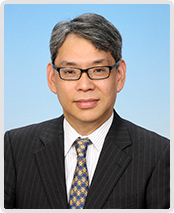
[Education]
Doctor Course, Graduate School of Economics, The University of Tokyo (April 1986- March 1991)
B. A., Faculty of Economics, The University of Tokyo (April1982-March 1986)
[Employment History]
Professor, Faculty of Economics, Gakushuin University (April 2013-Present)
Professor, Graduate School of Economics, Nagoya City University (December 2005-March 2013)
Associate Professor, Faculty of Economics, Nagoya City University (October 1997-November 2005)
Associate Professor, Faculty of Economics, Yokohama National University (April 1991-September 1997)
E-mail:![]()
Economic Policy, Financial Economics, Japanese Economy
The Japan Society of Monetary Economics (Director, 2012-Present, Co-editor of Review of Monetary and Financial Studies, 2011-Present)
Japan Economic Policy Association (Director, 2001-2006, Co-editor of Journal of Economic Policy Studies, 2003-Present)
Japan Association for Applied Economics (Co-editor of Studies in Applied Economics, 2010-2012)
Policy Reform, Financial Crisis, Japan's Prolonged Stagnation
Various economic phenomena bring about differing advantages and disadvantages to each person. By becoming knowledgeable in economics, you will be able to understand not only the effect a phenomenon has on your surroundings, but also how it affects others in different countries, regions, and generations. The real thrill of using economic knowledge is to come up with problem-solving ideas while respectfully collaborating with others, with the underlying basis of a deep understanding towards the situation of others. I look forward to seeing all of you develop through your college life into adults with rich ideas backed by economic knowledge.